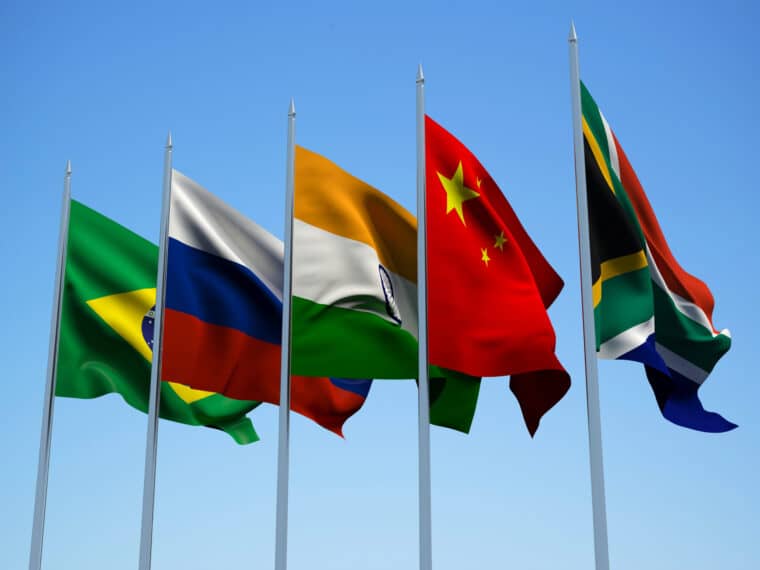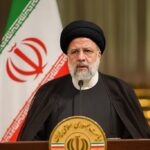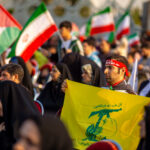With Egypt, Ethiopia, Saudi Arabia, the United Arab Emirates and Iran joining the BRICS at the beginning of 2024, the group now embodies a group of influential states on the international stage, representing 46% of the world’s population and 29% of global GDP. While 2024 is synonymous with an important electoral year for several BRICS members, further enlargements could take place in the coming years. Are we heading for an alternative international order? What are the strategic advantages of the BRICS+? Can they embody the voice of the global South? Interview with Jean-Joseph Boillot, Associate Research Fellow at IRIS, specialised in the Indian economy and the emerging world.
A new mandate for Vladimir Putin in Russia, a historic setback for the African National Congress (ANC) in the South African elections, a narrow victory for Narendra Modi in India, new elections to come in Iran following the death of Ebrahim Raissi and in Ethiopia… 2024 is a pivotal electoral year for many BRICS+ countries. Should we expect any repercussions from these elections on the international agenda of the BRICS+ states?
Quite possibly, as the BRICS+ are a fairly heterogeneous group. All it takes, as we saw in Argentina, is for Javier Milei, a pro-American liberal, to be elected to leave this group. But what is interesting is to see that, even with the Indian elections, the results of which returned Narendra Modi with a small majority, most of the countries of the so-called ‘Global South’ are fundamentally united, with a strong internal consensus to finally free themselves from the Western international order known as Bretton Woods. So, with one or two exceptions, there can be changes of government without undermining this very strong consensus. And while some would like to see the BRICS+ as a confrontational anti-Western club, in reality it is clear that, with Saudi Arabia, the United Arab Emirates and Egypt joining the group recently, the consensus is more along the lines of multi-alignment, rather like India, which has recently moved closer to the United States without severing its relations with Russia, for example. For the time being at least, elections in the developing world do not seem to be challenging this majority consensus in the South, and I am not talking about fake elections like the one in Russia with the election of Putin.
Since the expansion of the BRICS+ at the beginning of 2024, what analysis can be made of the group’s economic expansion? What are its strengths and strategic advantages?
We can see that the myth of a BRICS+ grouping that is more powerful than the Western economies and capable of turning the tables has not been borne out, nor are the BRICS+ a marginal phenomenon in the evolution of the world economy. What we can see is that the BRICS+ are more a fairly flexible grouping, born of the political will of the countries of the South to be taken seriously in international forums – which are still largely dominated by the West – rather than an alternative world order, except no doubt in Moscow’s mind. One example of this is Russia’s assumption of the BRICS presidency this year, because Brazil held the G20 presidency and could not do both. If you look at the way Russia is leading the preparatory sessions for the Kazan summit in October, you will see that the agenda is relatively empty. There are hardly any meetings, and no decisions have been taken. On the monetary front, for example, there was the idea of a common currency, but this has not progressed.
In a way, this reassures us that, instead of moving towards a confrontational world between two blocs, we are moving towards a South-North confrontation, but within the existing international architecture and in particular around institutions that need to be reformed, such as the International Monetary Fund (IMF) and the World Bank, which are still largely dominated by Western countries, unlike the United Nations, where the countries of the South are much more represented.
It should be noted, however, that the entry of Saudi Arabia, Iran and the United Arab Emirates is tending to reinforce a certain ‘cartelisation of the world’ under the BRICS umbrella in the key areas of raw materials, food, energy and metals. Some countries in the South now have strong political leverage over the critical raw materials they claim. This poses a problem, because most of the so-called countries of the South are not in fact producers of these raw materials. There is therefore a risk that within the BRICS+ club, there will not be a confrontation for the time being, but a difficulty in finding a point of balance between the interests of the producer countries and the interests of the consumer countries. For example, Africa, one of tomorrow’s giants in raw materials, is being courted by China, but also by Russia and the Gulf States. The challenge for the continent will be to avoid becoming dependent on this cartel.
With Thailand having recently applied to join the BRICS+ and numerous countries such as Mexico, Algeria and Turkey likely to join the group, what are the possible horizons for the BRICS+? Can they embody in a homogeneous way the voice of the so-called ‘global South’?
It seems unlikely that not only will the BRICS+ become a structured organisation, but that the club will be able to be ‘THE’ voice of the countries of the South. The reason for this is that a majority of countries tend to adopt positions of multi-alignment, of double-dealing between Western countries and the emerging or re-emerging powers of the South in the broad sense of the term, including Russia. The vast majority of the developing world does not wish to fall into a dependency that would be Russian-Chinese, for example. Those who gave during the Cold War, such as Angola, are now biting their fingers. The expansion of the BRICS, which will continue – albeit very probably at a moderate pace – relatively dilutes power within the organisation and prevents any one group from gaining the upper hand. This explains why progress has been so slow on the question of a monetary alternative to the dollar, or on actual disbursements from the BRICS bank, which is now headed by a Brazilian.
We would therefore be moving more towards what could be described as a meeting forum, and in particular a pre-G20 forum – since the BRICS have got into the habit of meeting before every G20 or other major international summit, with the aim of harmonising the positions of the South and collectively influencing decisions, as the G7 countries did. It is therefore rather positive that the BRICS are being enlarged to include countries that represent visions and interests that are a little different from those of the five founding countries, such as Algeria, Indonesia, Vietnam and Thailand, which seems to be serious about its application. It will also be interesting to see whether the election of Mexico’s new president alters the country’s thinking about joining the club at a time when the United States is totally opposed.
In the four possible scenarios described by French researcher Julien Vercueil, it seems that we are heading towards a scenario of continued expansion of the BRICS rather than its break-up and decline, as some had thought. But in this expansion scenario, rather than the world economy being divided between the South and the North, we would be moving towards growing contestation leading progressively to reforms of the global economic order. This seems the most likely scenario, given the way the first enlargement was carried out. The second enlargement may not take place in 2024 because India and Brazil are not very keen on it. So the countries that have applied will certainly have to wait until 2025. But what’s a year when you’re talking about reforming the architecture of the world?
Translated by Deepl.
Le point de vue de Jean-Joseph Boillot
Source: French Institute for International and Strategic Affairs (IRIS)







